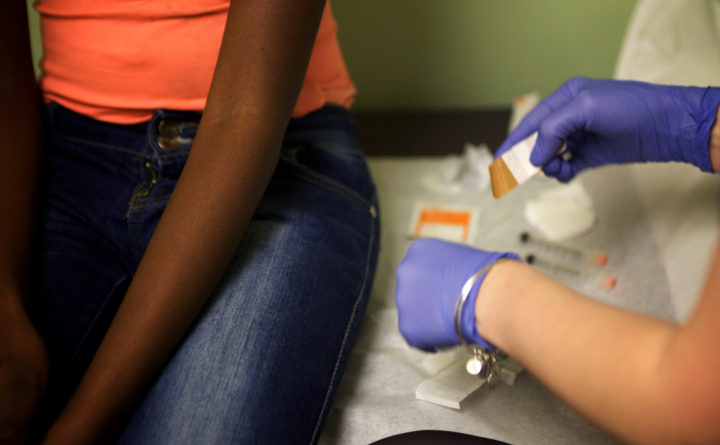
Some Mainers are gearing up for a fight over the future of the state’s philosophical exemption for childhood vaccinations, a battle that is expected to play out during the upcoming legislative session.
That’s because many Maine families are choosing against vaccinating their children, and some lawmakers would like to change that. Nationally, nearly 2 percent of parents chose not to immunize their kindergartners for non-medical reasons last year. In Maine, 5 percent of parents of public and private school children decided against immunization, according to the Maine Center for Disease Control and Prevention.
Rep. Ralph Tucker (D-Brunswick) is among the Maine lawmakers, public health advocates, medical professionals and others who want that number to start trending downward. He’s planning to introduce a bill in the next legislative session that would eliminate the non-medical exemption for vaccines, including exemptions for both religious and philosophical reasons, thereby improving the state’s vaccination rate.
[Subscribe to our free morning newsletter and get the latest headlines in your inbox]
It’s a question of public safety, he said, adding that if vaccination rates drop too much it will affect “herd immunity,” when enough people in a group are vaccinated to prevent the spread of disease, even to unvaccinated individuals. At this point, the lawmaker is not sure if the bill would affect students at private schools as well as public schools, but current Maine immunization requirements apply to both types of schools.
But vaccine critics such as Ginger Taylor, director of the Maine Coalition for Vaccine Choice, disagree. Taylor thinks fears about high vaccination opt-out rates are overblown and that the dangers she said she perceives vaccines pose are ignored by medical officials and lawmakers alike. She and other like-minded parents are planning to push back against any effort by Tucker or other lawmakers to limit parental vaccine choice.
“We look forward to these hearings. We have hundreds of families now who are so angry and so fed up with this,” she said. “We literally work on informed consent. Parents need to be able to know the risks and make informed choices.”
Global and local issue
But the debate over vaccine safety and necessity rages on, despite the vast majority of public health experts agreeing that vaccination is a good thing. The World Health Organization even has a webpage encouraging people to embrace the facts about vaccines, and not the myths. Among the facts cited is that if we stop vaccination, deadly diseases will return.
“When people are not vaccinated, infectious diseases that have become uncommon can quickly come back to haunt us,” the World Health Organization said.
Medical professionals say that misinformation is what has caused many parents to avoid or delay vaccinating their children. A long-running but false connection between vaccines and autism has been difficult for public health officials to overcome.
Mainers such as Rep. Tucker agree that the debate over vaccines can have real-world consequences. Maine, with its relatively high vaccine opt-out numbers, also has one of the highest rates of pertussis, a contagious respiratory disease better known as whooping cough, in the country. Tucker said that he knows a bill limiting exemptions won’t be passed without a fight, but he thinks it will be popular among the majority of Mainers.
“We basically have two groups of parents. Parents who want to protect their kids in the schools, and other parents who don’t want to get the immunizations and vaccines, but still want to attend public schools,” he said. “I think the overwhelming majority wants to have safe schools. The minority, they are very intense, but they are a very tiny group.”
Every state has legislation requiring vaccines for students, and every state grants exemptions to children for medical reasons. While most grant religious exemptions, Maine is among just 18 states that allow philosophical exemptions for those who object to immunizations because of personal, moral or other beliefs, according to the National Conference of State Legislatures.
Most schools in Maine with very high vaccine exemption rates, such as 25, 40 and even 100 percent, are private or charter schools, but a handful of public schools show exemption rates of 25 percent or more, including elementary schools in Lamoine, Blue Hill and Mount Desert. You can check the rates at your child’s school on this list published online by the Maine Center for Disease Control and Prevention.
Taking the debate to lawmakers
Sen. Linda Sanborn (D-Gorham), a retired family doctor, was a state representative in 2015 when she sponsored a bill that would have mandated parents who choose not to vaccinate their children for non-medical reasons to have a consultation with a health care provider. The Maine Legislature passed the bill, but Gov. Paul LePage vetoed it. She said she is hopeful that the next legislative session will see a bill limiting vaccine opt-outs become law.
“I do believe it’s a very important issue, and if Ralph [Tucker] was not bringing the bill back, I would have led the charge. I feel so strongly about it,” she said. “I think that our big concern is about the people who are at risk when there are low vaccination rates. We’ve definitely seen increased cases of whooping cough this year, and I think that’s a sign that our low vaccination rates are definitely a problem.”
Sanborn said she doesn’t agree with Taylor that chickenpox and other childhood illnesses are not serious diseases.
“I think that’s absolutely wrong,” she said. “Those diseases can be deadly. We certainly see deaths from chickenpox every year and people can have prolonged illnesses from pertussis, or even succumb to the disease. To say that it’s not a significant risk for people and we should just allow them to be sick is, in my opinion, wrong.”
Sanborn said she hopes Gov.-elect Janet Mills will be a bigger supporter of childhood vaccinations than LePage has been. So does Gordon Smith, the executive vice president of the Maine Medical Association, a group that is working to curtail the numbers of unvaccinated children in public schools.
“I would hope we have support from the Mills administration and the Legislature,” he said. “The level now of unvaccinated children coming in to public schools is alarming. This is not about mandating anything. If the exemption bill should pass, parents would still have a choice. If they want access to public schools, they would have to have their child immunized. Otherwise they would have to homeschool their child.”
Mills, through her spokesman Scott Ogden, said she will carefully review any legislation to modify current state vaccination policy and supports education efforts in this regard.
“As a general matter, she believes that vaccinations are critical to protecting the health and welfare of Maine people, especially children, and help prevent the spread of contagious diseases that are harmful to Mainers,” Ogden said.
This time around, the legislative hearings surely will include pro-vaccine Maine parents such as Rebecca Watson, a Portland attorney and mother who recently started the Facebook group Maine Families for Vaccines. She said the state’s rising rates of parents who opt out of vaccinating their children concern her.
Watson said she believes the vaccine choice movement has been both organized and loud, and wants to make sure people hear more from Mainers, like her, who support childhood vaccination and want more Maine children to be protected.
This article originally appeared on www.bangordailynews.com.






